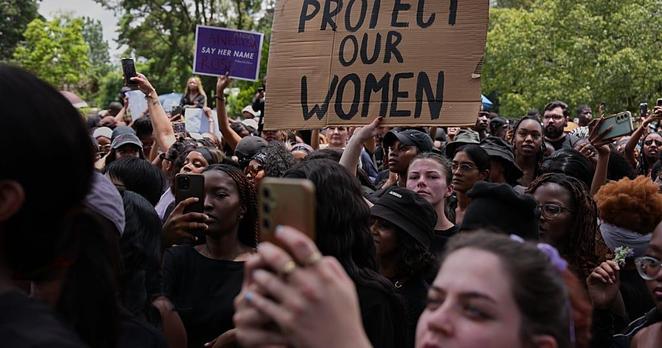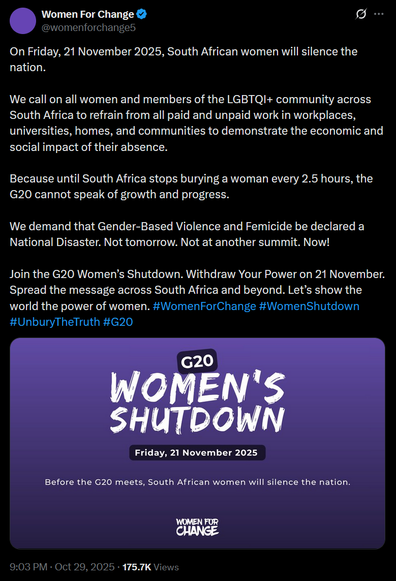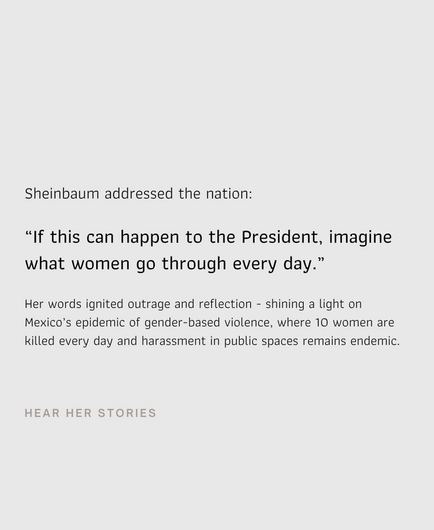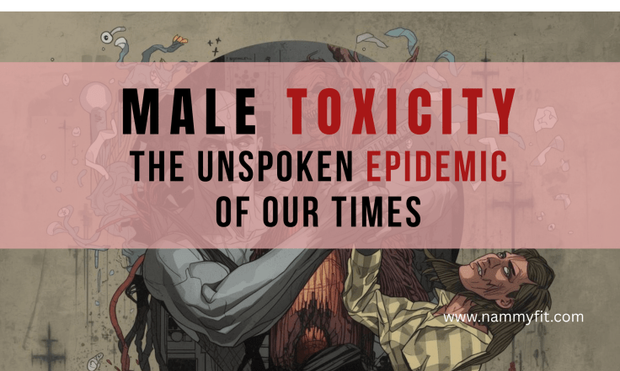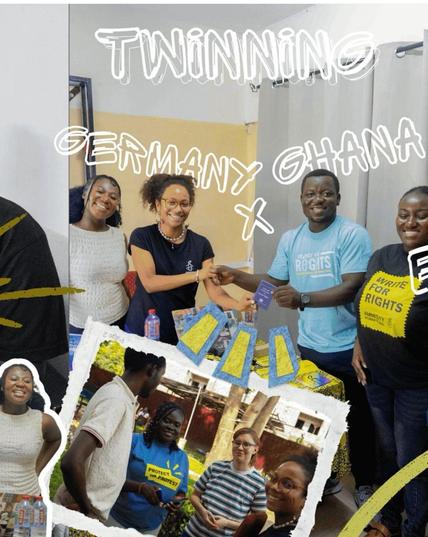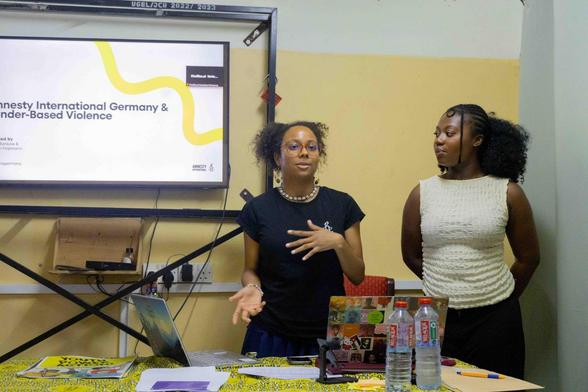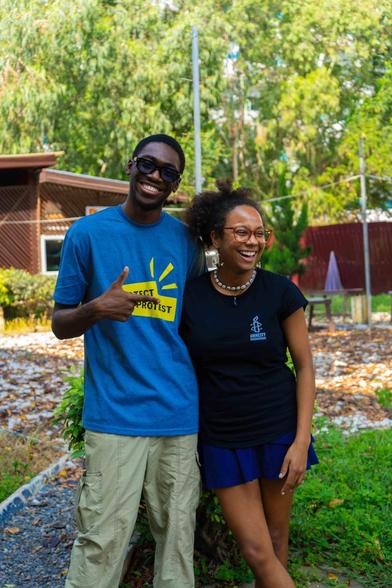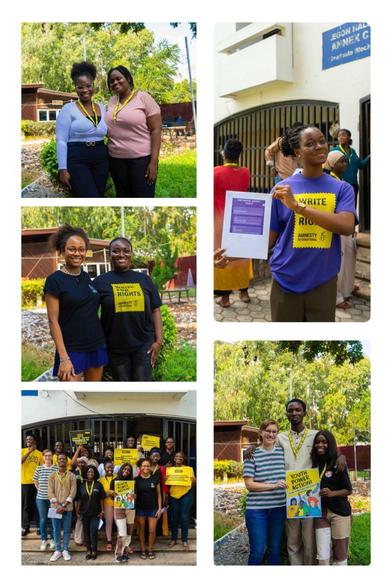🇿🇦 South Africa’s President Cyril Ramaphosa’s recent speech acknowledged femicide and Gender-Based Violence as a national ‘crisis’
First reactions online suggest that many are not satisfied with the empty promises continuously given by the presidency. Many will still move ahead with the ‘G20 Womens Shutdown’.
What do you believe will come from President Ramaphosa’s speech? Let us know in the comments 👇🏾
🎤: Zee Ngema
#womenforchange #genderbasedviolence #gbv #G20SouthAfrica #G20LeadersSummit
Every day in South Africa, at least 15 women are murdered and 117 women report rape cases to the police.
It’s time to confront the painful truth: most cases of Gender-Based Violence and Femicide (GBVF) are committed by someone the victim knows – a partner, ex-partner, family member, or close friend. Yet, countless women remain trapped in their own homes, silently enduring unimaginable abuse behind closed doors.
1/3
#SouthAfrica #GBV #GenderBasedViolence #femicide
https://womenforchange.co.za/petition-gbvf-national-disaster/
"Because until South Africa stops burying a woman every 2.5 hours, the G20 cannot speak of growth and progress."
link below:
https://x.com/womenforchange5/status/1983595583937114586
Rather than heightening her security, Sheinbaum announced she will continue walking among citizens, saying she refuses to lead from fear. Her decision is now being hailed as a turning point, a rare instance where power met vulnerability without silence.
.
.
.
3/3 🧵
#ClaudiaSheinbaum #Mexico #Women
#JusticeForWomen #EndViolenceAgainstWomen #GenderBasedViolence #LeadershipWithCourage #WomenInPolitics #HearHerStories #UNWomenMexico #PublicSafetyForWomen
Male Toxicity: The Unspoken Epidemic of Our Times
Male toxicity refers to patterns in which masculinity is constructed around dominance, emotional suppression, aggression, entitlement, and power over others. These patterns are not just private. They are social. They affect relationships, families, workplaces, and institutions. For many women, they signal that marriage, long-term commitment, or shared life may not feel safe or equal. For society as a whole, they erode trust, safety, and fairness.
The slow rot beneath the surface
Toxic masculinity is not just about men behaving badly. It’s a social design. It’s the way masculinity has been built around dominance, emotional suppression, aggression, entitlement, and control. These traits aren’t private quirks, they are public forces shaping families, workplaces, and institutions. For many women, they make partnership feel unsafe or unequal. For society, they corrode trust, fairness, and peace.
We like to talk about progress, women breaking barriers, gender equality gaining ground, workplaces growing more inclusive. But beneath this surface of modernity runs a darker current. Male toxicity isn’t a few bad men or isolated events; it’s a cultural flaw we’ve normalized.
From the boardroom to the bedroom, women are still told to “adjust.”
If a husband is angry, it’s her tone.
If a male boss is rude, it’s her lack of resilience.
If a boy is violent, it’s the mother’s fault for being too soft.
Generation after generation, women learn that safety and dignity are negotiable — because the world forgives male aggression and rewards female endurance.
The unbearable normal
We have learned to live with male toxicity. That may sound harsh, but look closely. Every time a woman is told to “adjust,” we ignore her discomfort. Every time abuse is excused as “temper,” we dismiss the harm. Every time a child hears “boys will be boys,” we reinforce harmful expectations. These actions renew an ancient social contract. This contract trades women’s safety and dignity for the comfort of male entitlement.
This contract has governed homes, workplaces, and nations for centuries. What’s different today is that women are walking away, from marriages, from unsafe workplaces, and from the illusion that patience will reform patriarchy.
What we are witnessing is not rebellion. It’s survival.
A society built to forgive men
In India, normalization begins early. Boys are taught control, not compassion. Girls are taught silence, not self-respect. A son’s anger is excused; a daughter’s pain is dismissed. One grows up entitled to power; the other learns to live with fear.
This conditioning seeps into every institution. Marital rape is still not a crime. Domestic violence is underreported and often withdrawn under pressure. NCRB data in 2024 revealed that every third woman in India faces domestic abuse at some point — and that’s only what’s recorded. “Adjust and endure” remains society’s silent policy.
Globally, the pattern repeats. Men dominate headlines not for what they build, but for what they destroy.
In the U.S., most mass shooters are men.
In Iran and Afghanistan, male authority strips women of freedom.
In wars across Ukraine, Gaza, and Sudan, men plan and prolong destruction, while women and children pay the price.
Whether it’s a man taking hostages, an abusive husband setting a woman on fire, or a CEO silencing a female employee, the pattern is chillingly consistent: violence, power, control.
Society doesn’t just tolerate male toxicity. It rationalizes it.
And men suffer too, trapped in narrow roles of provider, protector, or punisher. Deprived of empathy and emotional literacy, they become victims of the very system they benefit from.
But women still pay more, in unpaid care, emotional labor, and the daily effort to survive male rage. Every mother raising a son today carries a quiet fear: What kind of man will he become if the world keeps teaching him that softness is weakness?
The workplaces of silence
India’s workplaces mirror its homes. Hierarchies are invisible but powerful. Leadership remains male-heavy; aggression is mistaken for competence.
This “masculinity contest culture,” as researchers call it, rewards dominance, long hours, and posturing.
Women who resist are labeled “difficult.” Men who refuse it are labeled “weak.”
This silent toxicity costs more than morale. It drains innovation, deepens attrition, and erodes collaboration. Yet most organizations still treat it as an HR topic, not a governance issue. Diversity workshops cannot fix what leadership refuses to name.
A generational reckoning
We stand at a crossroads.
Our children will inherit either our silence or our courage.
If we keep excusing toxicity as tradition, they will grow up in broken families, unsafe workplaces, and emotionally barren relationships.
The collapse won’t be sudden. It will creep in, as loneliness disguised as freedom, fear disguised as caution, and mistrust disguised as independence.
Women will stop believing in love.
Men will stop understanding intimacy.
Society will fracture, not from ideology, but from the absence of empathy.
If we do not break this cycle, the future will look like this:
- Women opting out of marriage and motherhood altogether.
- Workplaces divided by resentment, not respect.
- Children growing up without emotional compass.
- A world run by angry men,emotionally bankrupt and morally desensitized.
Male toxicity is not just a gender problem. It’s a civilizational one. It corrodes empathy, destabilizes homes, and threatens the very fabric of human connection.
We must pause. Rethink. Rebuild.
Because a culture that teaches women to adapt and men to dominate is not sustainable. It is violent, and it is collapsing.
Reform, education, and accountability are tools. But introspection is the beginning.
Each man must examine the privileges he mistakes for rights.
Each institution must confront the behaviors it quietly rewards.
Each family must stop raising sons who think respect is optional.
Male toxicity is not a women’s burden to fix. It is society’s disease, and curing it will demand collective courage.
If we fail, our children will inherit a world where empathy is extinct, equality is fiction, and humanity itself feels unsafe.
That is the true cost of silence.
#culturalPatriarchy #domesticViolence #emotionalAbuse #feminismInIndia #genderInequality #genderJustice #genderSensitization #genderBasedViolence #maleToxicity #maritalRapeLaw #masculinityCrisis #patriarchy #policyReform #powerAndControl #socialReform #societalConditioning #theHinduEditorial #toxicMasculinity
Some impression from an event on #genderbasedviolence at the #UniversityofGhana on Monday.
After an input from the German delegation of #AmnestyInternational on consent a discussion followed in which many personal stories, grievances, and insights were shared.
Plus, a new twinning was set up between the University of #Ghana in #Accra and the University of #Hamburg 🎉 🤝 Woohoo!!! Congrats!
The partnership's #TwinningProgramme brings together #Amnesty groups from both sections.

